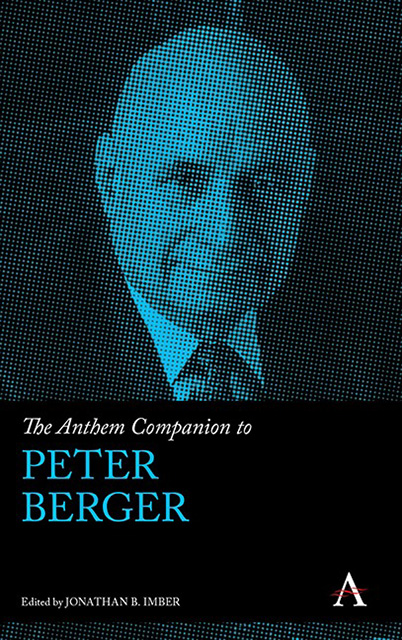Book contents
- Frontmatter
- Contents
- Introduction
- Chapter 1 Plurality, Choice, and The Dynamics of Doubt
- Chapter 2 Peter L. Berger and The Challenge of Modern Pluralism
- Chapter 3 Making Peace With Pluralism In America
- Chapter 4 Religion and Secularity in A Desecularizing Russia
- Chapter 5 The Moral Limits of Religious Pluralism
- Chapter 6 Peter L. Berger and Arnold Gehlen: Secularization, Institutions and Social Order
- Chapter 7 Peter L. Berger’s Three Religions
- Chapter 8 Objectivation: The Material Heritage of Peter L. Berger
- Chapter 9 Peter L. Berger’s The Social Construction of Reality
- Chapter 10 The Untaken Road to Phenomenological Sociology
- Chapter 11 Cheering for Capitalism
- Chapter 12 Peter L. Berger and Economic Sociology
- Chapter 13 Peter L. Berger Changed The Direction of My Work … and My Life
- Chapter 14 Peter L. Berger On Religion as Choice Rather Than Fate
- List of Contributors
- Index
Chapter 9 - Peter L. Berger’s The Social Construction of Reality
Published online by Cambridge University Press: 17 October 2023
- Frontmatter
- Contents
- Introduction
- Chapter 1 Plurality, Choice, and The Dynamics of Doubt
- Chapter 2 Peter L. Berger and The Challenge of Modern Pluralism
- Chapter 3 Making Peace With Pluralism In America
- Chapter 4 Religion and Secularity in A Desecularizing Russia
- Chapter 5 The Moral Limits of Religious Pluralism
- Chapter 6 Peter L. Berger and Arnold Gehlen: Secularization, Institutions and Social Order
- Chapter 7 Peter L. Berger’s Three Religions
- Chapter 8 Objectivation: The Material Heritage of Peter L. Berger
- Chapter 9 Peter L. Berger’s The Social Construction of Reality
- Chapter 10 The Untaken Road to Phenomenological Sociology
- Chapter 11 Cheering for Capitalism
- Chapter 12 Peter L. Berger and Economic Sociology
- Chapter 13 Peter L. Berger Changed The Direction of My Work … and My Life
- Chapter 14 Peter L. Berger On Religion as Choice Rather Than Fate
- List of Contributors
- Index
Summary
Peter L. Berger’s and Thomas Luckmann’s major, most renowned, and significant book is definitely The Social Construction of Reality. A Treatise in the Sociology of Knowledge, published in 1966 (Berger/Luckmann 1989 [1966]). This publication is considered as classical writing of the sociological discipline. The International Sociological Association (ISA) lists it as the fifth most influential sociological book written in the twentieth century (ISA 1998), directly after Max Weber’s The Protestant Ethics and the Spirit of Capitalism (Weber 1958). The ground-breaking success of The Social Construction of Reality had to do with the specific zeitgeist of the 1960s combined with a re-definition of a sociology of knowledge and uniting presumably very contrary theoretical social scientific paradigms of Max Weber, Emile Durkheim, and George Herbert Mead (Eberle 1992). The “revolutionary spirit” of the current times was combined with a decisive new orientation in the social sciences, specifically with respect to sociology of knowledge. If we follow Berger’s argumentation, the book was written in the eve of the cultural revolution in the Western world, in the late 1960s, when the social sciences and other disciplines were characterized by various forms of neo-Marxism. The two authors did use Marx’ writings, but they were not Marxists (Endress 2019: 57). Berger describes the late 1960s as “an enormous rock concert” (Vera 2016a: 23). But the effect of the book came later, because according to Berger, in the cacophony of cultural upheaval the sober tone of the book could not be appreciated: “It is not possible to play chamber music at a rock festival” (Berger 2011: 92; Steets 2016a).
Both scholars, Berger and Luckmann, were students of the Graduate Faculty at the New School for Social Research in New York City, where one of their teachers, Alfred Schutz, had a major impact on their work. Especially, when the idea for the Social Construction project came up, as Peter L. Berger explains in his autobiography (Berger 2011), it was Schutz who gave the initial idea for it. Berger and Luckmann participated in Schutz’s seminar on the sociology of knowledge, in which Schutz mainly dealt with the work and critique of other social scientists, leaving his own perspective apart.
- Type
- Chapter
- Information
- The Anthem Companion to Peter Berger , pp. 99 - 114Publisher: Anthem PressPrint publication year: 2023

